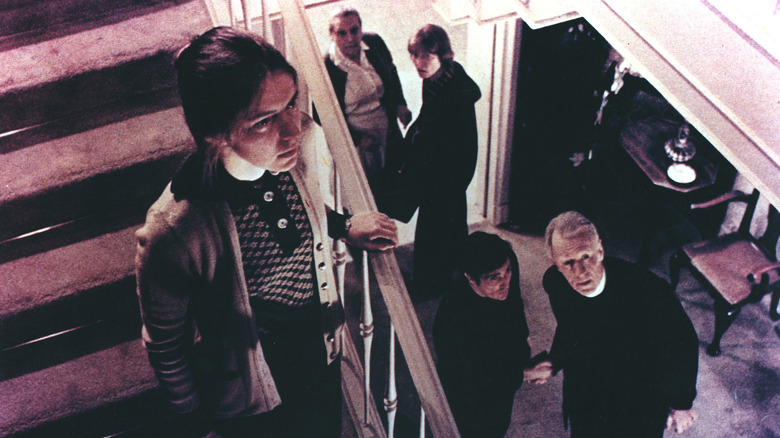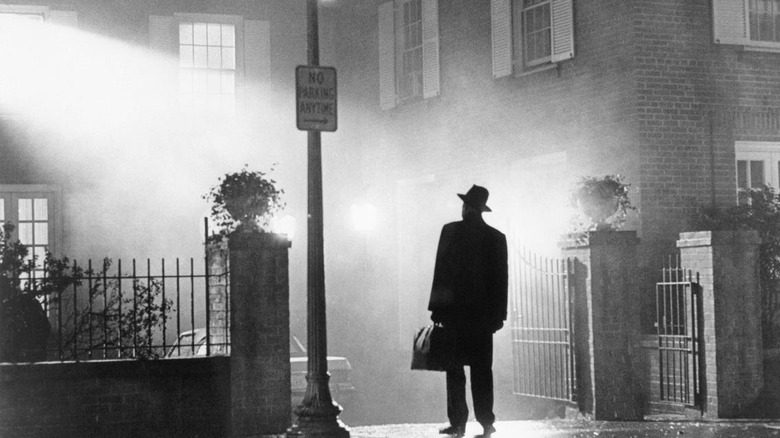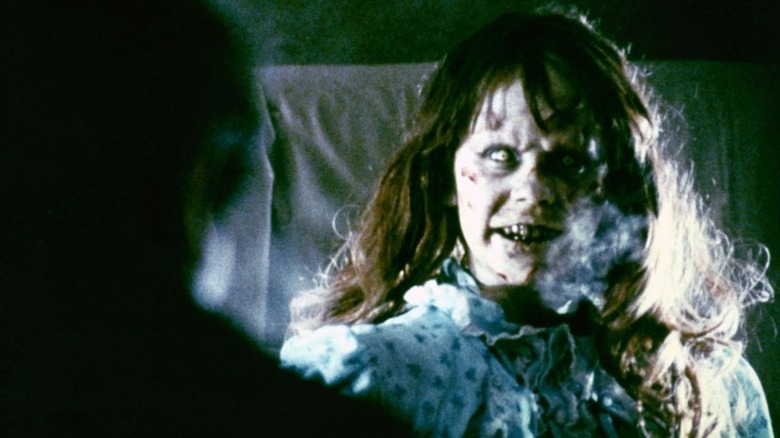The Exorcist Stunned Audiences In 1973, But One Terrifying Scene Wasn't Seen Until Decades Later
(Welcome to Scariest Scene Ever, a column dedicated to the most pulse-pounding moments in horror with your tour guides, horror experts Matt Donato and Ariel Fisher. In this edition: Ariel digs into one of the most iconic scenes from "The Exorcist", while Matt questions if the scene really is all that.)
It was boxing day in 1973 when "The Exorcist" hit theaters. I'm not sure how many Americans know what boxing day is — here's your periodic reminder that I'm Canadian — but it's the day after Christmas when everything goes on sale. On that frigid winter day in Yorkville — once a creative hub in the '60s, now known for its high-end shops — my mom and dad went to the University Theatre to see "The Exorcist." She'd read the book, and had to see the movie. They waited in line for the next showtime in below freezing temperatures, covered in fresh snow. When they finally sat down, it was so much more than my mom had anticipated. Too much, in fact. She wanted to leave, but my dad, a stubborn mule, refused. So they toughed it out together, building a legacy around it for me and my brother.
My aunt would go one step further, albeit inadvertently. She and my uncle lived in Colombia at the time, and my eldest cousins were toddlers. Well, my aunt came home to a small earthquake after seeing it in the theater. It shook my cousins' beds just enough to scare the sh*t out of her.
Everyone was watching "The Exorcist." Rumors of its shock value were everywhere, fuelling the furor to see this unimaginably terrifying movie. There's even footage of people fainting at some screenings, sometimes leaving the theater inconsolable. "The Exorcist" was no joke.
And yet, one scene was cut from the original release for technical reasons. We would later get that scene spliced back into the movie in its 2000 restoration which I saw at the age of 13. It's what helped solidify "The Exorcist" as the scariest movie I've ever seen, making it impossible for me to look at a set of stairs or hear my cat get the zoomies for years after the fact.
We're talking about the spider walk.
The Setup
Chris MacNeil (Ellen Burstyn), a well-known actress, moved to Georgetown with her 12-year-old daughter, Regan (Linda Blair), for a new film she was shooting. Life seemed idyllic, and the two had a very clear bond with a loving relationship. Then, one day, Regan starts complaining that her bed keeps shaking, waking her up. There are strange noises coming from the attic. Rats, Chris presumes.
Progressively, the situation worsens so much so that they can only turn to one person for help — the Exorcist.
The Story So Far
After playing with a Ouija board — mistake number one, frankly — Regan tells her mother about the friend she made who she calls Captain Howdy. Over a seemingly short period of time, Regan's behavior starts to change. She causes a scene at one of Chris' parties, coming downstairs after being tucked into bed, staring down one of her mother's guests — an astronaut — and telling them "You're going to die up there." She then pees on the floor in front of all of them, dead-eyed, unblinking.
"What's wrong with me?" she asks her mother later, after getting cleaned off in the bath and put back to bed. The doctors seem to think it's just nerves. Chris encourages her to keep taking her medicine, and everything will be fine. As soon as Chris leaves the room, she hears crashing coming from behind the door coupled with Regan's terrified and pleading screams. She rushes back into the room to find the bed violently shaking, almost levitating off the ground.
After this, Regan starts to become more aggressive and violent. She starts swearing and lashing out, saying things that make her seem "psychotic," as Chris describes at one point.
The doctors start to increase their efforts, supposing her behavioral changes are due to a lesion on the brain. Yet scan after scan brings back absolutely nothing — all of her tests come back completely normal.
The Scene
After visiting Regan's doctor to get the results of the most recent set of scans — which come back with absolutely no answers — Chris, dejected, drives herself back home from the hospital. There's a chaotic scene at the foot of a steep stairwell behind their house. Police cars, crowds. Something's happened, but Chris thinks nothing of it and drives on. She has to get home to Regan.
She walks in the door to find the phone ringing and no one there to answer it, the lights flickering on and off. Chris answers the phone, only she's a second too late — the line's dead.
The lights go out as Chris looks around the kitchen. "Sharon?" she calls out for her assistant (Kitty Winn). As the lights flicker back on, a hideous face flashes briefly next to Chris' as if staring at her from just out of view. Did we imagine it?
Chris leaves the kitchen to go upstairs and check on Regan. She opens the door to see her little girl fast asleep, but the bedroom window wide open, the frigid winter air turning the room into an icebox. She closes the window, pulls the blanket up over her shoulders, and rushes downstairs as soon as she hears the door open.
"What the hell do you mean going off and leaving Regan alone by herself?" Chris says as she runs down the stairs. "Didn't he tell you?" Sharon asks. It seems Chris' director, Burke Dennings (Jack MacGowran), had stopped by as Sharon needed to run out for a refill of Regan's prescription. She'd asked him to stay for a few minutes and watch her, but, evidently, it seems like he bailed. A drunk — of which we're aware by this point — Chris isn't the least bit surprised that he'd just leave.
Their anger subsides, and Chris hangs up her coat as the doorbell rings incessantly. Chris opens the door to see Chuck (Ron Faber), the assistant director for the film she's working on, looking somber. "I suppose you heard," he says. "Heard what?" Chris asks, understandably frustrated by everything. "You haven't heard," Chuck says as he takes off his tuque. Sharon's face falls as her eyes widen, and Chuck says, bluntly, "Burke's dead."
At first, Chris' expression doesn't change, as if she's waiting for the punchline of a very unfunny joke. The news is so shocking that it seems like she can't wrap her head around it.
He tells them how Burke must've been drunk, as he was found at the bottom of the stairs behind their place — where the big kerfuffle was on her way home — with his neck broken.
It hits Chris all at once, and she punches the wall, shaking through sobs. Chuck leaves quietly and quickly. Chris turns around slowly as she quietly calls out to Sharon, only to be interrupted by the sound of what sound like footsteps scurrying upstairs.
Thud thud thud thud thud!
Her eyes quickly turn to the top of the stairs as her face falls completely still. "Oh, my God" is all she can get out, in a whisper.
Regan runs down the stairs upside-down, contorted in an unnatural position. She scurries like a spider (hence the now-infamous name of the scene), reaching the bottom of the stairs and spewing out blood through an inhuman hiss.
The Impact (Matt's Take)
"The Exorcist" is an unmissable theological horror classic that benefits from its hypnosis as a whole experience. Horror fans around the globe recall Regan's spider walk scene because of its out-of-nowhere interruption — but as a single clip? Something is lacking from Regan's blood spew and unnatural mobility as a standalone scare deemed too terrifying for mainstream audiences. Maybe that's a "test of time" conversation rather than failure in a devastating moment.
I'm more excited by the feat of acrobatic satanism. It's the very first encounter in Universal's Halloween Horror Nights maze dedicated to "The Exorcist." Does an ultimate scare hold shock values after it's been replayed beyond a videocassette's mendable wear? It's a nasty practical effect that stuns because it's such a surprise — the conversation is bleak enough — only for Regan to remind audiences she's still possessed and seeking attention. It's nothing I'd want to encounter in my everyday activities but lacks the "extreme" qualities that once haunted censor boards.
Maybe I'm just a broken shell of a horror fan who's become desensitized by "A Serbian Film" or "Martyrs" or any other exploitation stomach-churner. I'm not quite scared by Merriam-Webster's definition of the word but shiver out of respect nonetheless. A single scene in "The Exorcist" feeds countless nightmares, and that's a testament to craftsmanship. I'm here for the quality of execution more so than sleepless implications because "The Exorcist" — at the time — elevated the bar for horror terrors and challenged filmmakers to summon the audience's next breaking point.


